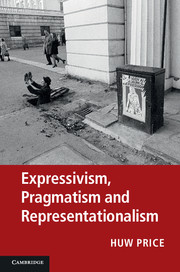Book contents
- Frontmatter
- Dedication
- Contents
- Notes on contributors
- Preface
- PART I THE DESCARTES LECTURES 2008
- PART II COMMENTARIES
- 4 Pragmatism: all or some?
- 5 Global anti-representationalism?
- 6 Naturalism, deflationism and the relative priority of language and metaphysics
- 7 How pragmatists can be local expressivists
- PART III POSTSCRIPT AND REPLIES
- Bibliography
- Index
4 - Pragmatism: all or some?
Published online by Cambridge University Press: 05 July 2013
- Frontmatter
- Dedication
- Contents
- Notes on contributors
- Preface
- PART I THE DESCARTES LECTURES 2008
- PART II COMMENTARIES
- 4 Pragmatism: all or some?
- 5 Global anti-representationalism?
- 6 Naturalism, deflationism and the relative priority of language and metaphysics
- 7 How pragmatists can be local expressivists
- PART III POSTSCRIPT AND REPLIES
- Bibliography
- Index
Summary
EVERYDAY REPRESENTATION
The conference at which an ancestor of this paper was first delivered was unusual for me. If we think of philosophers who emphasise reference, representation, fact, truth, truth-makers and ontology as conservatives, on the right, and we think of those who talk instead of expression, discourse, norms and social practices as radicals on the left, then I amusually attacked from the right. My quasi-realist, right-wingers say, pretends to give us what we want by way of facts and truth but is really only offering us a sham: fools' truth, or fools' facts. He is insufficiently enchanted by truth-makers and ontology and the paradises of metaphysics. But on this occasion I was much more likely to be ambushed by the left. The quasi-realist, it might be said, plays along with too much of the stock-in-trade of the right, retaining notions of reference and representation and even attacking iconic figures of the left for their more wholehearted expulsion of any such notion anywhere and everywhere. The quasi-realist is not a card-carrying revolutionary, they say, but an arrant trimmer. In Huw Price's more sympathetic eyes, I have been a valiant but sad Moses figure, who helped to show the way to the Promised Land but who could never manage to enter it himself. And, as any student of politics knows, the temperature when agitators of different shades of pink air their differences rises just as high as it does when they rail against those on the right.
- Type
- Chapter
- Information
- Expressivism, Pragmatism and Representationalism , pp. 67 - 84Publisher: Cambridge University PressPrint publication year: 2013
- 35
- Cited by



